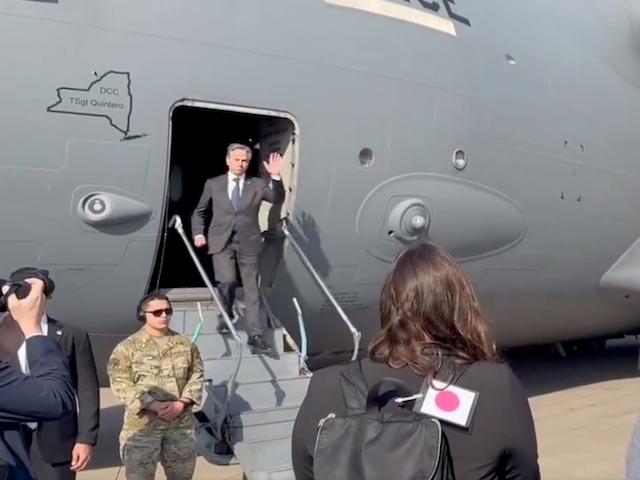In yet another diplomatic mission to the Middle East, the fifth since Hamas's brutal assault on Israeli civilians on October 7th, U.S. Secretary of State Antony Blinken has initiated pivotal discussions in Cairo, aiming to navigate through the complexities of the escalating conflict between Israel and Hamas.
This strategic visit underscores the U.S. commitment to brokering peace, with a focus on achieving a ceasefire and securing the release of hostages held captive by Hamas. Blinken's agenda is also critically aligned with addressing Egypt's growing apprehensions regarding Israel's military strategies near the Egyptian borders, especially in densely populated areas where displaced Palestinians have sought refuge.
🚨🇺🇸BREAKING: BLINKEN IN CAIRO FOR HOSTAGE DEAL NEGOTIATIONS
— Mario Nawfal (@MarioNawfal) February 6, 2024
The U.S Secretary of State is meeting with Egyptian leaders to try and push forward the ceasefire/hostage deal between Israel and Hamas.
He also wants to diffuse tensions after Israel announced they would eventually… https://t.co/9mF24i7a5s pic.twitter.com/Sy06Ls53JF
The potential expansion of Israeli military operations to Rafah, a town situated along the Egyptian border, has raised alarms. This region, home to a significant portion of Gaza's population, now finds itself in a precarious situation, with the Israeli Defense Minister openly declaring intentions to target the area. The move has prompted a substantial increase in the displacement of Palestinians, exacerbating an already dire humanitarian crisis.
Egypt's concerns are deeply rooted in its decades-long peace treaty with Israel, a pact that now faces potential strain. The prospect of increased military presence along its border with Gaza, particularly in Rafah, poses a threat not only to the treaty's stability but also risks a humanitarian crisis should Palestinian civilians flee into Egypt. The Egyptian government has been vocal in its determination to prevent such outcomes, emphasizing the necessity to keep Palestinians within Gaza's borders.
Blinken returns from his roughly 2-hour meeting with Saudi Crown Prince MBS and Foreign Minister Faisal bin Farhan, offering a wave but no comment pic.twitter.com/DZfq6FbU8M
— Olivia Gazis (@Olivia_Gazis) February 5, 2024
Blinken's diplomatic efforts extend beyond the immediate ceasefire negotiations. His discussions with Egyptian President Abdel Fattah El-Sisi also delve into broader regional dynamics, including the potential normalization of relations between Israel and Saudi Arabia and the overarching goal of preventing further escalations within the region. These objectives, however, are mired in challenges. The path to a ceasefire is complicated by fundamental disagreements between Hamas and Israel, particularly concerning the terms of the truce and the contentious issue of a Palestinian state—a concept Israel currently rejects.
The mediation efforts have involved multiple stakeholders, including the U.S., Egypt, Qatar, and Israel, culminating in a proposed deal presented to Hamas. Blinken's itinerary, which includes stops in Doha and Israel, aims to solidify support for the ceasefire and address the ongoing humanitarian crisis in Gaza. His recent dialogue with Saudi Arabia's Crown Prince Mohammed bin Salman in Riyadh further highlights the critical need to address the humanitarian implications of the conflict and explore avenues for a lasting peace that includes a viable plan for Palestinian statehood.
U.S. Secretary of State Antony Blinken is back in the Middle East pushing for a ceasefire in Gaza, but Israeli Prime Minister Benjamin Netanyahu has revealed his forces could soon advance into Rafah. pic.twitter.com/eHWhBzpCvV
— 10 News First (@10NewsFirst) February 6, 2024
The human cost of the conflict is profound, with the Palestinian death toll reaching staggering numbers, including a significant impact on women and children. The war has ravaged Gaza, leading to widespread displacement and severe shortages, pushing many to the brink of starvation.
Israeli Prime Minister Benjamin Netanyahu's commitment to continuing the offensive until Hamas's military capabilities are dismantled and all hostages are freed adds another layer of complexity to the pursuit of peace. Despite some progress, such as the release of hostages during a temporary ceasefire, the path forward remains fraught with uncertainty.
Palestinians huddling under bombardment in Gaza said they hoped a visit to the region by the US secretary of state would finally deliver a truce, in time to head off a threatened new Israeli assault on the last refuge at the enclave's edge https://t.co/T8HpERcqHQ
— Reuters (@Reuters) February 5, 2024
This expanded narrative captures the intricate web of diplomatic, humanitarian, and geopolitical challenges that define Blinken's mission. As he navigates through these turbulent waters, the goal of achieving a sustainable peace in the region, while addressing the immediate needs of those affected by the conflict, remains paramount.


